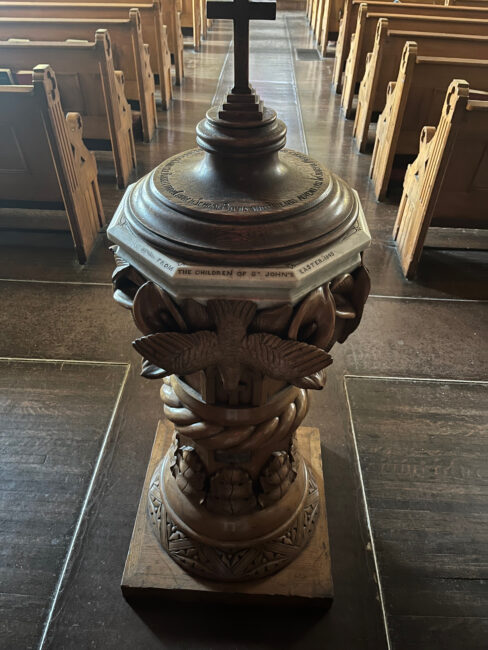Sermon — September 22, 2024
The Rev. Greg Johnston
Sometimes we talk about our spiritual lives as a kind of quest, an adventure toward an unknown destination in the hope of finding treasure along the way. We seek enlightenment. We look for meaning. We talk about finding God in the sunset, or in the woods, or finding God in other people.
And life is a quest, a voyage into the unknown. The world is a complicated and strange place, and let’s face it: You can show up to church every week, you can try to spend some time in meditation or in prayer, you can talk a walk through nature or through the city as often as you like, but you never know quite when or where you’re going to encounter God.
Except, here’s the thing: Jesus tells us exactly when and where to find him. It’s just that when we do, it sometimes doesn’t quite feel how we expect.
So, the New Testament and I have been on close personal terms for a while now, and I can think of four different places where Jesus tells us where we can find him when we go looking.
First and foremost, he says that we can find him in the Eucharist, in the bread and wine that we receive, after he hear him say, yet again, “This is my Body,” and “This is my Blood.” However physically or spiritually you want to interpret that, the Church has always believed and the experience of individual Christians has often confirmed that we encounter God in a unique way in this communion meal; that this is not only a symbol or a reminder of Christ’s life, but a place in which he truly does become present. So, place one: bread and wine.
Place number two, Jesus tells the disciples that “where two or three are gathered in my name, I am there among them.” (Matthew 18:20) And we tend to extrapolate from there—where two or three or thirty-tree or three-hundred-and-three are gathered in Jesus’ name, there Jesus is among them. So when we come here, on Sundays; or when a smaller group gathers on Thursday mornings for our Bible study, or Thursday evenings for Centering Prayer; whether it’s the choir rehearsing or the Garden Committee pruning or the children of the church stampeding around, wherever two or three are gathered in his name, Jesus is there.
Third: Jesus tells us that we find him in people who are hungry and thirsty, sick or in prison or in need of clothes. He tells us that whenever we feed someone who is hungry, we feed him; whenever we clothe someone who lacks clothing, we clothe him; whenever we visit someone who is sick or in prison we’re visiting him. And after listing each of these specific cases, he states the general principle: “Truly I tell you,” he says, “just as you did it to the least of these who are members of my family, you did it to me.” (Matthew 25:31-40)
These three are the ones we tend to repeat in the Church. The high church folks will tell you about the real presence of Christ in the Eucharist. The low church folks will tell you about finding Jesus in a small group gathered for prayer. The social justice wing of the church has started whole ministries on the basis of this last quotation from Matthew 25. Heck, just this week one Episcopal Church out in Oregon just won a $400,000 lawsuit against their city, which tried to shut down their ministry to people who are homeless and hungry, because a federal judge agreed that feeding people who are hungry is a religious act.
But we don’t often talk explicitly about the fourth place Jesus tells us we will meet him in this world, the one that he tells us about in the Gospel reading today.
The disciples are arguing with one another about who is the greatest. They have, as usual, completely missed the point. They’ve forgotten the reminder that if they want to follow him, they should take up the cross. They still think they’re going to find greatness in this world; that following the way of the cross on which Jesus will die will somehow lead to glory.
So he tells them, “Whoever wants to be first must be last of all, and servant of all.” And then he takes a “little child” and he “puts it among them,” and he says: “Whoever welcomes one such child in my name welcomes me, and whoever welcomes me welcomes not me but the one who sent me.” (Mark 9:37) And that’s the fourth place you can find Jesus, according to him. Not only when you receive communion or gather in his name; not only when you feed the hungry, or visit the sick; but even when you welcome a child in Jesus’ name, you’ll find Jesus there.
You might draw a connection to Jesus’ message about what true greatness is. You might even draw a connection to words we heard just before it, from James. The disciples are full of the wisdom of this world. They have “bitter envy and selfish ambition” in their hearts. They are, as James says, “boastful”; their arrogance will lead to “disorder and wickedness of every kind.” (James 3:14-16)
But then Jesus shows them a child. And on the one hand, the ideals of childhood seems to match so much of what James has to say. It’s the children of the world, Jesus might seem to say, the innocent, pure, humble children of the world, who are the model for the adults; it’s not the leader who’s the most arrogant or brash who is the greatest, but the one who is the most child-like.
On the other hand: Have you ever met a child?
I love children. I really do. I love my child, I love the children of this church. Taking children seriously, listening to their hopes and their concerns, is as much a part of my job as listening to the rest of you. And really, it can be pretty fun.
But I have never yet met a child who is “peaceable” and “willing to yield,” “full of mercy” and “without a trace of hypocrisy.” Sometimes it feels like half the day is taken up with “coveting something” that they “cannot obtain,” and that’s not to mention the inevitable “disorder… of every kind.” Not to mention, if Jesus’ issue is that the disciples are standing around arguing about who’s the best, then I don’t think being more like children is going to solve the problem.
Only: That isn’t what he says.
He doesn’t tell the disciples that if they want to become great, they should become more like children. He tells them that if they want to become great, they need to be willing to care for children. He tells them that they need to get down off their pedestals and welcome a child. They need to give up their pretensions to theological perfection and get their hands dirty instead, sometimes very literally.
Caring for children doesn’t always feel like a spiritual practice. It doesn’t tend to replenish and refresh us in the kind of way we’re looking for when we say we’re seeking God. There are moments of awe and wonder, of course, and plenty of fun, but “welcoming children,” in Jesus’ name or not, is exhausting work. Jesus tells us that when we do welcome children, we will encounter God there. But it doesn’t always feel like we’re encountering God. Sometimes it just feels very loud.
But of course: That’s true for those other three places, too. We don’t always feel God where we know we meet God. It’s a rare person who comes to communion every week and experiences a deep sense of spiritual fulfillment. We feel this way sometimes, but less often than we hope or need.
Wherever two or three are gathered in his name, Jesus may well be there. But churches are made of people—that’s the problem—and they are as full of rudeness and bad behavior as any other collection of people is. Many, many people burn out on the church, not because of any big trauma or abuse, but because of a thousand small frustrations that lead them to wash their hands of it all.
It’s easy to romanticize the act of feeding people who are hungry, or visiting people who are in prison; even visiting someone who’s sick isn’t always so pleasant. People act like people do, and even more so when they’re going through a hard time.
And yet, Jesus tells us that we will find him there. This is what it means to do what he said last week: to take up our crosses and follow him. This is what it means to be great in the kingdom of God, to roll up your sleeves and serve. To do something that might not feel like you’ve arrived at an enlightened state; but to do something to care for someone whom society considers “the least” of its concern. And to remember that even if you don’t feel God in that moment, Jesus is right there.




